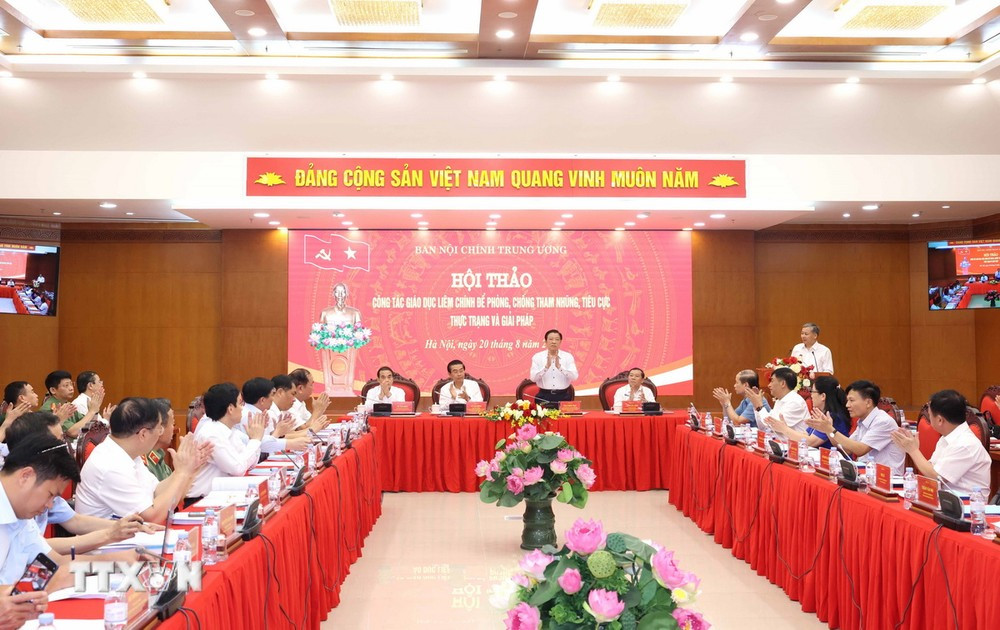Cadres, party members, civil servants and public employees must be honest, fair, upright and dedicated; and be paid and treated appropriately for their contributions and talents so that there is no need for corruption or negativity.

On August 20, the Central Internal Affairs Commission held a scientific workshop on "Integrity education to prevent and combat corruption and negativity, current situation and solutions" under the Project submitted to the Politburo for promulgation of a Directive on strengthening the Party's leadership in integrity education.
At the workshop, comrade Phan Dinh Trac, Politburo member, Secretary of the Party Central Committee, Head of the Central Internal Affairs Commission, Head of the Steering Committee for the Project, affirmed that the fight against corruption and negativity in recent times has been led, directed and implemented with very high political determination, carried out vigorously, resolutely, persistently, synchronously, comprehensively, methodically and in depth.
This struggle has made great strides, achieved many important results, left a good impression, created positive effects, and spread strongly throughout society. Anti-corruption has "become a movement, a trend," received the support, response, and appreciation of cadres, party members, and people, and has been recognized and shared experiences by countries and international organizations.
Comrade Phan Dinh Trac shared: "We have clearly identified and consistently implemented the motto of "four no's" in preventing and combating corruption and negativity. That is, "cannot," "don't dare," "don't want," "don't need" corruption and negativity. Forming a strict prevention mechanism to prevent corruption and negativity is to lock power in an institutional cage.
We have detected, prevented, promptly, strictly, fairly, and publicly handled negative acts of corruption so that no one dares to engage in negative corruption."
Along with that, moral education, building a culture of integrity, no corruption, no negativity becomes a cultural lifestyle of cadres, party members, civil servants, public employees and all classes of people do not want corruption and negativity.
Cadres, party members, civil servants and public employees must be honest, fair, upright and dedicated; and be paid and treated appropriately for their contributions and talents so that there is no need for corruption or negativity.
However, corruption and negativity in some areas are still complicated and serious, with major violations in the fields of land, bidding, securities, corporate bonds, banking activities, vehicle registration, healthcare, minerals, etc. causing particularly serious consequences.
There is collusion and connection between corrupt and degraded officials with businesses and organizations to make profits, causing loss of state assets, forming "interest groups," even dominating the work of officials and activities of state agencies, causing resentment among officials, party members and the people.
Therefore, it is necessary to study and summarize practices to find solutions to strengthen the work of integrity education, first of all for cadres, party members, and those holding power entrusted by the people to prevent corruption and negativity from the root, early, and from afar, contributing to building a clean, honest Party and political system that serves the Fatherland and the people.
Comrade Phan Dinh Trac emphasized that in Ho Chi Minh's thought, in Party documents, and legal regulations, the content of integrity, the meaning and importance of integrity ethics and integrity culture for the work of Party building and rectification, and the prevention and fight against corruption and negativity have been clearly demonstrated.
Looking at the world, education and integrity practice are also of interest to many countries. The United Nations and a number of international organizations also recommend that member countries practice integrity to prevent and combat corruption and good governance.
The problem now is what needs to be done, how to do it, and what is the responsibility of organizations and individuals in the political system to bring the policies and viewpoints of President Ho Chi Minh, the Party and the State into life, to build an honest state, an honest society, an honest nation, of the people, by the people and for the people, comrade Phan Dinh Trac clearly stated.
At the workshop, delegates exchanged, discussed and proposed specific solutions to further improve integrity education in the coming time, such as strengthening, innovating and improving the quality of integrity education in training programs for students towards building a team of honest officials, civil servants and public employees.
Delegates also mentioned solutions to strengthen integrity education for police officers and soldiers through training and fostering political theory; integrity in building a judiciary that serves the Fatherland and the people; integrity in public ethics; integrity in business activities; integrity education for cadres, party members, and employees in state-owned enterprises; the role and responsibility of Party committees and organizations in integrity education for cadres and party members to prevent and combat corruption and negativity; building integrity ethics and a culture of integrity in the economic and market mechanisms, etc.
TB (according to VNA)